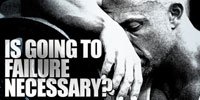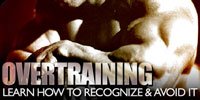| Article Summary: |

The Secret To BIG Gains!
Are you happy with the results you're getting from your training? I mean, really, are you genuinely content with your progress? Well, if you are, go ahead and click on the next article. But, if you feel as though you could be making more progress than you currently are, stick around. I bet that most of you keep reading.
Let's start with a question:
Apart from the basics (adequate nutrition, smart training, etc), what is the greatest contributor to slower than optimal gains?
Well, if you ask me, the answer is inadequate training frequency. The typical trainee simply doesn't train often enough to spark optimal gains in muscle mass. It's really common sense when you think about it: someone who stimulates a muscle to grow twice weekly will likely achieve better gains than someone who only stimulates that same muscle once within a week's time.

But What About Recovery And Overtraining?
-
These are two very misunderstood concepts in bodybuilding. To better understand the concepts of
recovery and
overtraining, we have to delve a little bit into the various types of fatigue. There are two primary types of fatigue - peripheral and central.
Peripheral fatigue (A.K.A. metabolic fatigue) occurs within the metabolic tissues of the muscle. Examples of peripheral fatigue are acute and/or delayed onset muscle soreness (DOMS), being in a state of negative protein balance (protein breakdown is greater than protein synthesis), etc.
| FATIGUE ARTICLE | ||
|
-
Central fatigue is within the brain and spinal cord (the Central Nervous System [CNS]). It is this type of fatigue that is of prime importance to our discussion of overtraining, recovery, and training frequency.
Now, this is not to say that peripheral fatigue isn't important, but provided that your nutritional and supplemental regimens are up to par, it's not a major factor, especially when compared to fatigue of the central nervous system.
For instance, it was originally thought that training a muscle while it was still sore from a previous workout would be detrimental to the recovery process and consequently gains in muscle mass; however, recent research and plenty of empirical evidence has proven this to be untrue.
Training a sore muscle does NOT adversely affect metabolic recovery.1,2,3 In fact, doing so can actually speed up the recovery process by increasing the flow of nutrient rich blood to recuperating muscle tissue.
Now, let's get back to central fatigue and overtraining. As stated previously, it is central fatigue that we as physique conscious individuals need to be concerned with.
When the CNS becomes fatigued, the body responds by decreasing anabolic hormone output and increasing the circulation of catabolic (muscle-wasting) stress-related hormones and inhibitory neurotransmitters; this pretty much puts the breaks on your muscle-building efforts. Motivation dwindles, performance declines, and progress stagnates - you become "overtrained."
| FATIGUE ARTICLE | ||
|
-
Simply put, fatigue of the CNS must be avoided at all costs. There are a number of variables that can contribute to exhausting the central nervous system, but for this purpose of this article, I am going to address those more specifically related to training:
1. Training to Failure:
-
First off, let's make sure we're all on the same page. While fairly self-explanatory, the term "failure" tends to carry quite a bit of ambiguity within the bodybuilding and fitness communities.
For simplicity's sake, we're going to define failure in terms of completed repetitions. If you complete a repetition (in good form), you succeed (at completing that repetition- no failure occurs); if you do not complete the repetition (again, in good form), you fail. This is failure.
Some strength coaches will try to tell you that if you barely complete the last repetition of a given set and would not be able to perform any subsequent repetitions, you have trained that set to failure. This is distorting the English language. When did you fail? You didn't. You fail when you attempt something and do not succeed.
| TRAINING TO FAILURE ARTICLE | ||
|
-
So how does this relate to fatigue of the central nervous system? Well, attempting to move a load and having to set it back down because you are unable to lift it again is extremely taxing to the CNS; this must be avoided.
Also, the use of forced reps (additional reps performed with the help of a spotter when you can no longer perform reps with the given load by yourself), is completely pointless and a waste of time. This further taxes the CNS and adds absolutely nothing to the stimulus generated to the working muscle.
Repeatedly using these tactics set after set, workout after workout will quickly leave you drained with very little desire to train. Therefore, it is my recommendation that you complete all reps possible, but never attempt an impossible repetition (or simply one that you will not complete in near perfect form).
2. Performing Annihilating Training Sessions:
-
I cannot overemphasize the importance of not annihilating muscle tissue in a single session. If you want a deep, dark, golden
tan, what do you do? Do you lay your pasty butt out in the hot sun for eight hours straight? Or do you expose yourself to the UV rays for an hour every other day? Hopefully, you'd choose the latter, since the former would be quite painful.
| OVERTRAINING ARTICLE | ||
|
-
The same is true with weight-training. A single, annihilating workout will leave you unable to function and only slows
recovery. A very general rule of thumb would be to perform no more than 20 sets in any given workout regardless of your training goal. When you leave the gym, you should feel fresh and motivated, not overly tired and rundown.
3. Getting Inadequate Sleep:
-
Any discussion regarding
recovery would certainly be lacking without at least some mention of
sleep. Both peripheral and central recovery take place at accelerated rates during sleep and the importance of getting adequate amounts of rest cannot be minimized.
Even if all else is taken care of (nutrition, smart training, etc) you'll likely feel drained during the day if you aren't regularly getting enough sleep. It is my recommendation that you get at least eight hours (preferably nine) of sleep each night and also try to catch a brief 30-minute power nap at some point during the day.
| SLEEP ARTICLE | ||
|
-
So, back to the question at hand. How do you know if the CNS needs further time to recover or if you're overtrained?
Even if you avoid all of the above, the CNS can still become overworked and overtraining can become apparent. It has been my experience (as well as the experience of numerous other strength coaches) by observing both myself and my clients that the best indicator of central fatigue is a loss of motivation.
I'm sure you can all remember a point in time (maybe you're dealing with it now) in which you loathed the thought of going to the gym and no longer looked forward to your training sessions. When this happens (when you lose your motivation to train), you can be sure that fatigue of the CNS is present and overtraining has begun to set in.
| RELATED POLL | |||
|
|||
-
If you find yourself in this situation, it is my recommendation that you cut back on your
training frequency and/or volume to allow for the CNS to recover. On a similar note, since we know that fatigue of the CNS kills motivation, you can assess whether or not your CNS has recovered by your degree of motivation.
If you are highly motivated to train, your CNS has recovered and you can train again, even if you are sore and/or have trained that body part recently.
Stop. Reread the last sentence. Now read it again.
If there is only one thing that you remember from this article, please let it be that sentence. This is a simple concept, but one that is often dismissed or overlooked: the more frequently you can train with a fresh CNS, the more gains you will make. You will gain more size and/or strength by training a body part twice weekly as opposed to only training it once.
| RECOGIZING OVERTRAINING ARTICLE | ||
|
-
The point is to listen to your body and train as frequently as possible. It seems almost too simple, but apply the concept to your training and watch your gains take off like never before!

Apply This Knowledge To Training:

-
Let's take a look at a couple ways to apply the information in this article to your training:
Method 1: Specialization
-
You can specialize a
lagging body part or parts (one large muscle group or two small muscle groups) that you are motivated to "bring up" by training it/them more frequently, up to three times weekly.
| SPECIALIZATION ARTICLE | ||
|
- Monday - 5 sets of 5 reps
- Wednesday - 10 sets of 2-3 reps
- Friday - 3 sets of 10 reps
- Monday - 6 sets of 8-12 reps
- Thursday - 12 sets of 3-4 reps
- Day 1: Chest and Biceps
- Day 2: Quads and Calves
- Day 3: Back and Triceps
- Day 4: Hamstrings and Shoulders
- Day 5: Off
- Day 6: Repeat
-
The important thing to note here is that when training a body part multiple times weekly, you should utilize a different rep range for each workout. Doing this will both stimulate different muscle fibers and will yield a different physiological response over the course of the week. Choose one of the following (assuming that
hypertrophy is the goal):
-
3 Workouts Weekly
-
2 Workouts Weekly
If you feel that the three weekly workouts are a bit too taxing, drop down to only two. If on the other hand you feel motivated to hit three sessions for a particular body part one week, by all means, go ahead and do so.
Method 2: Workout Short, Sweet, And Often
-
The key to this method is exactly what it says. Set your workouts up so that you are training often (close to everyday), but make it so that each session is short and sweet. This will keep you motivated, fresh, and looking forward to each session. I have found the following workout split to work well with this approach:
If you are motivated, skip day 5. Perform abdominal training outside of the gym once to twice weekly whenever you have some spare time to "de-stress." This approach will allow you to get in a few extra workouts each week without further draining your CNS.
| FREQUENT WORKOUTS ARTICLE | ||
|

That's A Wrap
I'm sure the information provided in this article will help many of you get motivated, stay motivated, and start making your best gains yet. Start applying the concepts presented today and watch your gains take off like Usain Bolt from the starting block!
References
- Nosaka K, Clarkson P.M. Muscle damage following repeated bouts of high force eccentric exercise. Med. Sci. Sports Exrc., 27(9):1263-1269,1995.
- Nosaka K, Clarkson P.M. Muscle damage following repeated bouts of high force eccentric exercise. Med. Sci. Sports Exrc., 27(9):1263-1269,1995. Smith LL., Fuylmer MG., Holbert D., McCammon MR., Houmard JA., Frazer DD., Nsien E., Isreal RG. The impact of repeated bout of eccentric exercise on muscular strength, muscle soreness and creatine kinase. Br J Sp Med 28(4):267-271, 1994.
- Nosaka K, Clarkson P.M. Muscle damage following repeated bouts of high force eccentric exercise. Med. Sci. Sports Exrc., 27(9):1263-1269,1995. T.C. Chen, Taipei Physical Education College, and S.S. Hsieh, FACSM,. The effects of a seven-day repeated eccentric training on recovery from muscle damage. Med. Sci. Sports Exrc. 31(5 Supp) pp. S71, 1999.








